
A Ku Klux Klan leader and a black Southern civil rights activist go from sworn enemies to best friends in Mark St. Germain’s truth-is-indeed-stranger—a whole lot stranger—than-fiction The Best Of Enemies, a West Coast Premiere that is also one of the finest Colony Theatre productions in years.
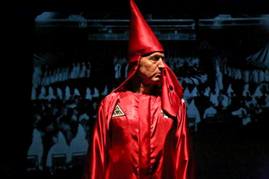 We first meet service station owner C.B. Ellis (Larry Cedar) in devil-red robe, hood, and mask, the Exalted Cyclops spewing racist bile so venomous, it’s hard to believe the usually play-it-safe Colony is taking such risks with its elderly, decidedly non-edgy subscriber base.
We first meet service station owner C.B. Ellis (Larry Cedar) in devil-red robe, hood, and mask, the Exalted Cyclops spewing racist bile so venomous, it’s hard to believe the usually play-it-safe Colony is taking such risks with its elderly, decidedly non-edgy subscriber base.
Still, there’s nothing the Colony does better than odd-couple dramedies (e.g. Trying, The Savannah Disputation, and Grace And Glorie, to name just three), and there can be no odder couple than Klansman C.B. and civil rights activist Ann Atwater (Tiffany Rebecca Royale) who, like their fellow odd couples before them, discover that the mere act of spending time with an opposite can indeed lead to, if not attraction, then at least mutual understanding.
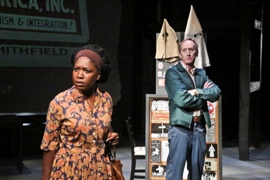 The year is 1971, fourteen since the Supreme Court ruled school segregation illegal, but for the black-and-white residents of Durham, NC, that particular change is still “gonna come” at some undetermined (and most likely distant) future time.
The year is 1971, fourteen since the Supreme Court ruled school segregation illegal, but for the black-and-white residents of Durham, NC, that particular change is still “gonna come” at some undetermined (and most likely distant) future time.
Hence the arrival from up north of African-American community activist Bill Riddick (Shon Fuller), sent by the US Department Of Education to organize a charette (defined as “a meeting in which all stakeholders in a project attempt to resolve conflicts and map solutions”) with the aim of making Brown v. Board Of Education a reality in Durham.
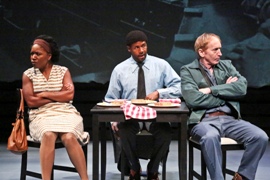 Riddick’s strategy is a clever if risky one—to persuade Ellis and Ann to not only participate in but actually co-chair the charette.
Riddick’s strategy is a clever if risky one—to persuade Ellis and Ann to not only participate in but actually co-chair the charette.
Fortunately, the wily Riddick proves more than up to the task, convincing the soon-to-be partners in progress that a) each is a vital, valued community member whose views must be heard and b) that if either one refuses to participate, the other side will surely win.
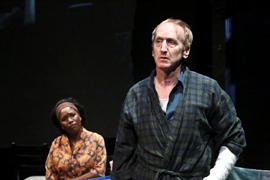 Not surprisingly, there are considerable sparks from the get-go, since downright scary as C.P can be, Ann’s outward bravado and inner fortitude allow her to give as good as she gets, even when no epithet she hurls at her enemy can possibly wound the way the N word can when spat out by a vile, vicious racist.
Not surprisingly, there are considerable sparks from the get-go, since downright scary as C.P can be, Ann’s outward bravado and inner fortitude allow her to give as good as she gets, even when no epithet she hurls at her enemy can possibly wound the way the N word can when spat out by a vile, vicious racist.
Still, it doesn’t take long for C.P. and Ann to discover that they have more in common than either of them could possibly have imagined. Neither finished their secondary education, both are parents of school-age children, each one struggles to make ends meet, and both find themselves beaten down by those who wield the real power in Durham, i.e. those with the money and social position to do so.
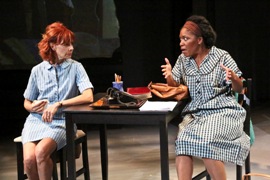 It helps that C.P. just happens to be married to Mary (Holly Hawkins), a woman who, though not without her own racial prejudices, has stubbornly refused to be part of the Klan even as her husband has left the care of their severely disabled son almost entirely up to her, all of which makes Mary a woman to be reckoned with.
It helps that C.P. just happens to be married to Mary (Holly Hawkins), a woman who, though not without her own racial prejudices, has stubbornly refused to be part of the Klan even as her husband has left the care of their severely disabled son almost entirely up to her, all of which makes Mary a woman to be reckoned with.
Ninety-five minutes may seem too short a running time for best of enemies to become best of friends. Then again, C.P and Ann’s charette lasted a grand total of ten days, by the end of which, the incredible had actually happened.
Also potentially problematic, at least for a director and design team, is the play’s construction as a series of short scenes, each of which takes place in an entirely different location, though director David Rose and some crackerjack production designers (and some ingeniously moved-around tables and chairs) do much to keep The Best Of Enemies zipping swiftly along.
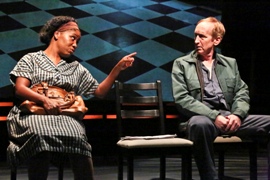 Most importantly, Colony stalwart Rose has cast a dream quartet of gifted actors who help convince us that a diehard racist can indeed end up embracing the object of his hatred given the right circumstances.
Most importantly, Colony stalwart Rose has cast a dream quartet of gifted actors who help convince us that a diehard racist can indeed end up embracing the object of his hatred given the right circumstances.
Cedar is fearless in revealing the ugliness of C.B.’s hate speech and equally fearless in showing us the frightened soul for whom vile words serve as armor.
Royale matches her costar every step of the way, giving us a sassy, spunky Ann whose “attitude” masks her own insecurities while making her an adversary who can give as good as she gets.
That both actors are masters of the physical, their body language speaking volumes each and every time they get within a few feet of each other, makes their performances even more delicious.
Fuller could not make for a more engaging, charismatic, oh-so savvy Bill, while Hawkins does beautifully multi-shaded work as Mary, adding up to as fine an ensemble as any production, director, or audience could wish for.
Scenic designer David Potts and sound-and-projection designer Dave Mickey work together to move us from scene to scene and locale to locale all the while transporting us to the early-1970s South through projected photos filling the upstage wall and a soundscape of recorded voices provided by Elyssa Alexander, Lacey Beegun, Madeline Ellingson, Dylan David Farris, John Favreau, Joshua Johnson, Taylor M. Hartsfield, Ben Hawkins, Connie J. Kim, Katie Lee, Wyn Moreno, Jesus Manuel R., Sarah Ripper, and Matthew G Wicks, all of them courtesy of Cal State Fullertons illustrious theater arts program where Mickey is Sound And Projection Design Professor.
Dianne K. Graebner’s period/character-appropriate costumes, Jared A. Sayeg’s vivid lighting, John M. McElveney’s assorted period props, Rhonda O’Neal’s spot-on wigs and hair design, and Orlando de la Paz’s impeccable scenic art all contribute to The Best Of Enemies’ snazzy look.
The Best Of Enemies is based on the book The Best Of Enemies: Race And Redemption In The New South, by Osha Gray Davidson.
Leesa Freed is production stage manager. Patricia Cullen is casting director.
If word can spread beyond Colony regulars to younger and African-American theatergoers and to surrounding high schools, The Best Of Everything could prove one of the Colony’s biggest hits in years. Informative, illuminating, and entertaining in equal measure, it is contemporary history-as-theater at its best.
Colony Theatre, 555 North Third Street, Burbank.
www.colonytheatre.org
–Steven Stanley
September 24, 2015
Photos: Michael Lamont
Tags: Ann Atwater, Bill Riddick, C.P. Ellis, Colony Theatre, Los Angeles Theater Review



 Since 2007, Steven Stanley's StageSceneLA.com has spotlighted the best in Southern California theater via reviews, interviews, and its annual StageSceneLA Scenies.
Since 2007, Steven Stanley's StageSceneLA.com has spotlighted the best in Southern California theater via reviews, interviews, and its annual StageSceneLA Scenies.







 COPYRIGHT 2025 STEVEN STANLEY :: DESIGN BY
COPYRIGHT 2025 STEVEN STANLEY :: DESIGN BY